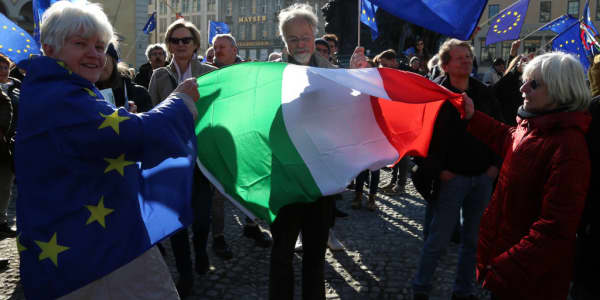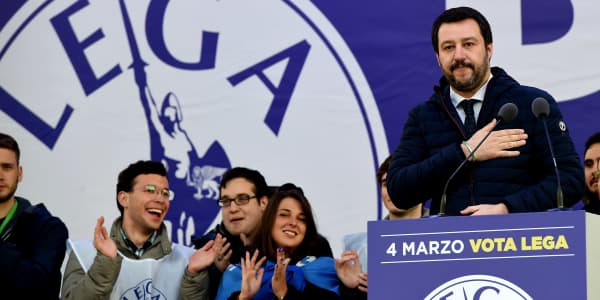Italians go to the polls on March 4 and the key issues of immigration and unemployment are likely to heavily influence voters, particularly in the southern island of Sicily.
Public opinion over the key issues in the political debate are likely to vary greatly from region to region, depending on how much immigration or unemployment affects the area. Palermo, the capital of Sicily, is no exception with both issues featuring heavily in the debate among citizens.
Sicily, and the small island of Lampedusa to its south in the Mediterranean, have been focal points for a continuing influx of migrants trying to reach Italy by sea.
Travelling what's known as the "central Mediterranean route," the majority of migrants arriving in Sicily have made the journey from poverty-stricken and war-torn parts of Africa and the Middle East.
In 2017, 119,310 migrants arrived in Italy after traveling by sea, according to data released in January from the UN's International Organization for Migration (IOM). The organization recorded that 2,832 people died or went missing making the journey.
Despite the high number of migrants in 2017, the IOM noted that 2017 had seen the lowest number of migrants in the past four years. At the height of the European migrant crisis in 2016, 181,436 people made the journey to Italy and 4,581 were recorded as dead or missing.
The Italian dream
For those that arrive in Sicily, the reality of little to no employment and growing public opposition to migration can be hard to contend with. But there are exceptions to the rule.
In 2015, Dine Diallo was one of the thousands of migrants that made the dangerous journey to Sicily. He told CNBC that the journey took him six months from his home country of Guinea in West Africa and cost him 3,500 euros ($4,271).

"Why did I come here? To answer that question, first of all, it was to save my life. My life wasn't secure, I was in danger and I decided to go somewhere else," he told CNBC in Palermo, where he has just set up a small business making children's toys.
"I've received my permission to stay here, and there are those who haven't received theirs yet, who applied for them over two years ago now, so when I look at it like that, it's positive. And with effort, I am little by little moving forward," Diallo, who's known as "Din" to his friends, said.
Din thanks his immigration lawyer Roberto Carmina for helping him obtain his permit to stay in Italy. Carmina told CNBC that the reality of reaching Italy doesn't often live up to migrant expectations, however.
"The reality is different from the dream of the people that arrive because here we have 57 percent of youth unemployment in Sicily."
'Big refugee camp'
The massive influx of migrants has proven to be a divisive issue in Italy and least of all, Sicily, and political parties along the political spectrum have made the issue a key part of their campaigns, all promising to impose tougher rules on migration.
As well as strains on infrastructure and the economy, the migration crisis has caused tensions with many Italians worried about the possible change in their culture.
Right-wing and populist parties have particularly sought to exploit the migrant crisis for political gain. Formerly known as Lega Nord, the rebranded Lega Salvini Premier party was initially set up to campaign for independence for northern Italy but has since changed its focus on national issues, particularly the immigration debate.
Lega's new name refers to party leader Matteo Salvini, whose prominence in Italian politics has grown since the party allied itself with Silvio Berlusconi's Forza Italia party, with whom the party stands a chance of governing within a grand coalition of center-right parties.
Sabina Bonelli, a parliamentary candidate for Lega Salvini Premier, told CNBC that Sicily had been turned into a "big refugee camp."
"The Mediterranean was a cradle of culture, trade and tourism but it's become a place where human traffickers bring lots of people and give them false hope," she said, adding that Italy needed to regulate migration and a law to block new arrivals.
Unemployment
With a rich history of invasion and conquest, architecture, arts and language, Sicily has a strong sense of cultural identity but the economy was affected more than most by Italy's financial crisis.
Far from the industrialized north in Italy and political center in Rome, Sicily has relied traditionally on agriculture for much of its gross domestic product (GDP), although tourism and minor industry is a part of the picture.
Still, Sicily was called the "Greece of Italy" by one business leader during the financial crisis in Europe and the region's economic output fell more than 13 percent between 2008 and 2015, according to Reuters, and is only slowly recovering.
A lack of gainful employment has enabled organized crime groups, most notably, the Cosa Nostra mafia in Sicily, to flourish over the decades although newspapers in 2017 reported that the local economy had gotten so bad on the island that even the Mafiosi were leaving the island in search of work. The recession has also made it much more difficult for hard-up businesses to pay protection money ("pizzo" in Italian) to the Mafia, Reuters said.
The lack of employment and financial situation in Sicily has exacerbated the immigration debate, with critics saying Sicily has little work to go around already. But Mayor of Palermo Leoluca Orlando, a member of the ruling Democratic Party, said Sicily had always been a welcoming place for migrants.

"There is no city in the world that changed so deeply and widely like Palermo. In the last 40 years we went through a tremendous changes. We started from being the capital of mafia to being the capital of human rights. Welcoming migrants is a way to communicate that we respect human rights, migrants are human beings," he said.
"And if you ask me how many migrants live in Palermo I say no one, who lives in Palermo is from Palermo, we need to make no distinction between people in Palermo who are born in Palermo and people in Palermo who are born in Pakistan, Bangladesh or Romania, Ghana or Sudan," Orlando said.





